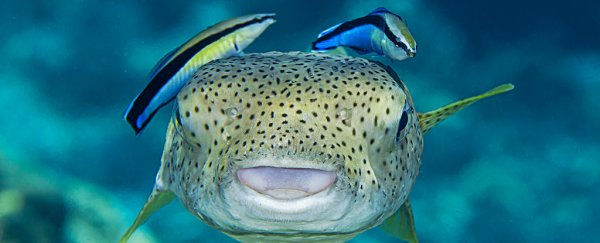The small, tropical fish known as a cleaner wrasse has just joined the ranks of various mammals and birds that have passed a classic test for determining self-awareness.
An international team of researchers have found the finger-sized wrasse are capable of recognising their reflection, suggesting some part of their brain must be aware of its own existence. Exactly what does that mean, though?
The mirror self-recognition test (MSR) test dates back to a study conducted on young chimpanzees in the early 1970s by the psychologist Gordon Gallup.
Never having seen a mirror before, the group of adolescent apes initially treated their reflections as a threat. After a small amount of time, their behaviour changed to reflect an awareness that the image was of their own body, as they used their reflections to groom and study themselves.
The assumption is that this change in behaviour reflects some kind of self-awareness – a mental model of their own body as distinct from friends, foes, or other parts of the environment.
Over the years other introspective animals have been added to the list, from elephants and dolphins to corvids and pigeons.
There have been some controversial contenders over the years from other walks of life.
A study on ants conducted several years ago suggested they could identify their own reflection. Two years ago, manta rays also acted oddly in front of mirrors, suggesting there was some sort of awareness behind their actions.
Researchers from Japan, Germany, and Switzerland have now collaborated to see if they could find more concrete evidence of another species of self-aware animal far from the typical intelligent furry and feathered varieties.
This is easier said than done. The golden standard relies on the animal reacting in an unusual manner towards a novel feature of their body through use of the mirror.
For example, if a spot of paint is added to your forehead, you'd look in the mirror and wipe your hand repeatedly across your brow. This shows you know that face in the mirror belongs to you.
This requires you to have the vision required to see the mark. It also requires you to know it's unusual and to have a way to point it out.
So the team settled on the cleaner wrasse (Labroides dimidiatus) as a potential candidate for fish self-awareness. It has decent vision, and is known for its ability to spot parasites on other fish and pick them off with its mouth.
Confident their subject would be able to see an unusual spot and remove it, the team put 10 fish into individual tanks with a personal mirror.
At first, the normally territorial animals behaved in the same way most animals react – they attacked, mistaking their reflection for a stranger on their turf.
This soon changed to something a little friendlier. Within days the fish were performing a dance, an odd behaviour for a typically solitary species.
Next, the researchers dabbed a spot of coloured gel on the heads of eight of the wrasse, placing it so they could only see it in the mirror.
All but one of the fish spent significantly more time in positions where the gel was visible in their reflection. Several spent more time than usual scraping that same area against parts of their environment.
But not everybody is convinced that this is proof-positive of self-awareness in the wrasse.
According to Yvaine Ye at New Scientist, Gallup believes it's possible the wrasse viewed the marks as parasites on the skin of other fish, and not a mark on their own bodies at all.
There's clearly plenty of room for debate. The research is available on the preprint server bioRxiv for anybody to read, so hopefully it will inspire discussion. There's still so much we don't know about this fascinating subject.
Even if it turns out animals with comparatively simple nervous systems, such as wrasse, manta rays, and even ants, all have true self-awareness, it's impossible to really know what this means in terms of experience.
Many animals we consider social and intelligent, such as dogs, cats, and octopuses, all fail the mirror test. Humans around the world also often struggle with it, with some cultures not passing until six years of age or older.
If failing the test doesn't indicate a deficit in other cognitive skills, it might be a leap to assume other cognitive factors are present when an animal passes it.
Cleaner wrasse might well have a simple mental system that matches their body with reflections.
But we should hold back from thinking they're contemplating their fate as they pick food from the teeth of a passing predator.
